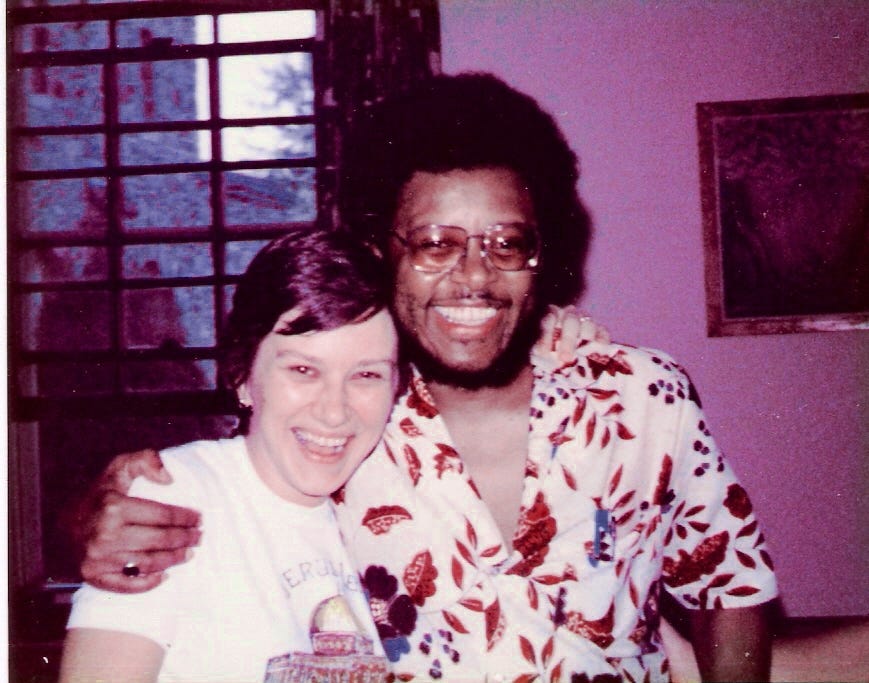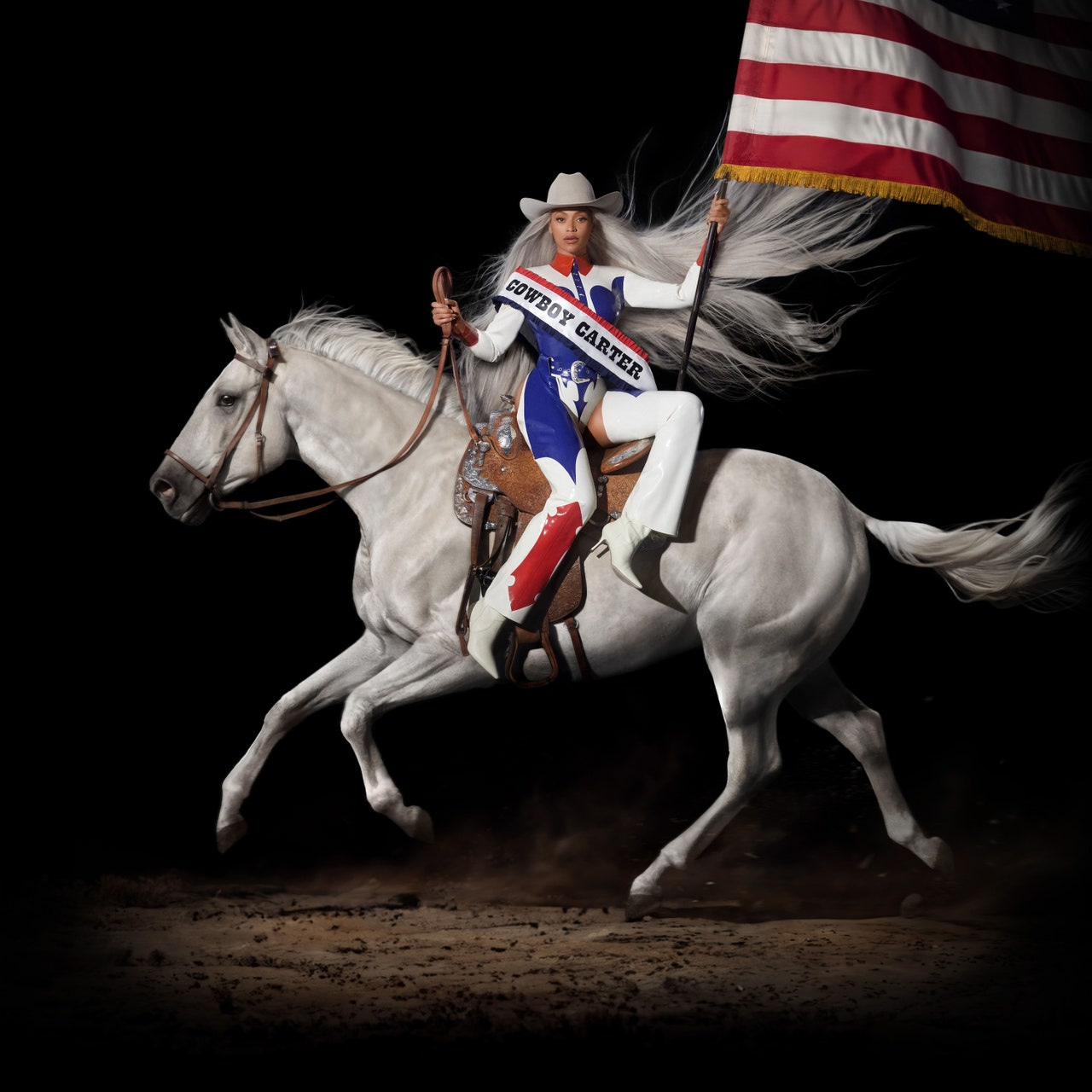The Spiritual Lineage of Cowboy Carter
Beyoncé's got something to teach us about the future of language, power, and belonging.
Last week, I talked about models. As prominent spiritual mentors all seem to lose their credibility simultaneously, we need to rethink the examples we take for granted as we look to an uncertain future. I offered my father as one example from my own life; his patience and consistency made much more difference than any dogmatism.
This question of models ties to another I raised in my first post: What happens when the languages of love and liberation are taken up by power and violence? It’s one of the biggest reasons our models of faith have lost so much credibility; the love they preach is really about the “permission structure” of their own power:
But if we continue using the same language as them, don’t we damage our credibility?
The answer would seem to be yes. I spoke with a colleague a few weeks ago who said disgraced evangelical pastor Mark Driscoll’s influence and infamy are so felt in the Seattle area that you can’t admit to being a Christian if you want to have any kind of social life. In their community, Christianity is a religion of shame, trauma, and exploitation. No one has any patience for it anymore.
So the questions need to be asked together: when we look for models on which to pattern our spirituality, do we look to those who use the same language we’re used to? Or to something entirely different?1
I’m going to go out on a limb and ask Beyoncé.2
Beyoncé’s Cowboy Carter is deservedly making waves. I’m not particularly electrified by her style (I’m not a Swiftie, either, which may send some of you scrambling for the Unsubscribe button) but when Bey does something, I notice.
This is partly for aesthetic reasons. I may not be so into the music, but pop artists of late have a way of building surprisingly radical, provocative, and even esoteric symbolism into their album covers. Just recall the hubbub around Halsey's If I Can’t Have Love, I Want Power (2021).
Beyoncé probably does this better than anyone, as the cohesiveness of Lemonade’s (2016) artistic vision demonstrates. Now, on Cowboy Carter, she rides into frame sidesaddle on a white horse, decked out in red, white, and blue western wear complete with winner’s sash and waving an American flag. She exudes the sheer effortlessness of making a point.
For those who don’t know the background, Nashville native and fellow Christianity-and-culture commentator Tyler Huckabee has a great post explaining Bey’s confrontation with country music and its fans’ shameless, transparent rejection of her. Huckabee calls Cowboy Carter a “middle finger” to the whole apparatus.
Which I think is…right? But also a little blunt. The “middle finger” exists in our minds as a crass show of defiance and contempt, but this doesn’t seem to match Bey’s own feelings about the whole thing. Cowboy Carter isn’t just about defiance; it’s nonviolent subversion and reclamation at its finest.
Historian Jemar Tisby puts it perfectly in his own write-up:
Instead of letting the racists win and…claim ownership over an entire genre of music, Beyoncé “did a deeper dive into the history of Country music.” In creating this album, and she took her time doing it, Beyoncé models the approach that more of us should take when dealing with racism in the world.
In other words, Beyoncé’s “middle finger” wasn’t a knee-jerk flaunting of her own celebrity, backed by her confidence as an artist. It was a careful, studied take-down of country music’s self-mythologizing. She intimately investigated black art’s relationship to a white industry, and found a hidden history. Then she participated in a long tradition of bringing said history to the surface. She did the work, took her time, turned rejection into art, and what’s more said–of country music and American symbolism more broadly–“You cannot take this away from me.”
I find the story behind Cowboy Carter especially provocative because it represents the opposite of my usual instinct as a frustrated, left-tilting millennial Christian in America. I get resentfully obsessed with how my country–and my religion–has lied away from its espoused values and often feel more than willing to throw the whole thing under the bus. After all, we’re here to assume the worst; let’s call the American Dream dead-on-arrival and the religion that legitimated that dream with it.3
But Beyoncé helps me question this impulse. She’s laying hold of an ideal version of America. It lives under our collaboratively built history, always haloing our best efforts and worst excesses, but it has never been allowed to fully materialize. What’s more, she’s also insisting she belongs here, in this America. And it belongs to her.
As Tisby explains, there is a whole tradition of black scholarship and artistry leading up to Cowboy Carter. And on top of making visible a long-erased history, it scandalously (to me, anyway) insists on the survival of the American ideal in the face of tremendous prejudice, dehumanization, and violence. It echoes Langston Hughes’s poem, “Let America Be America Again” (1936):
O, yes,
I say it plain,
America never was America to me,
And yet I swear this oath–America will be!
Black writers, poets, and musicians have long refused to cede the idea of America to the sin of racism. And according to theologian James Cone, their mission was not one of pure critique, but of redemption.
Which brings us back to our questions about the survival of the church and of Christian spirituality under the specter of white Christian nationalism.
The fact is, this is not the first time that anyone’s felt the need to wrestle “true” Christianity back from violent, oppressive theology. It’s truer to say that this fight started before the birth of the nation and never stopped. Many of the same artists and scholars Cone and Tisby cite battled not just for the soul of America but for Christianity as well. They offer these activists as models who proved and preserved the faith, acting as its beating heart while violence perverted it. Their being American and their being Christian was a nonviolent defiance of both nation and religion–but also an expression of faith in both, and an invitation to bring both to life again.
They did not, furthermore, need a “new Gospel” to accomplish this; as DuBois, Hughes, and Beyoncé did with history, others surfaced “God’s message of liberation in an unredeemed and tortured world” from Scriptures they shared with their oppressors (Cone, The Cross & the Lynching Tree, 155).
Cowboy Carter offers these ingredients to the spirituality we’re trying to cultivate: it teaches us never to cede control of our symbols to power and prejudice, which bend them to bolster their own myths. The language of the Gospel is one of those symbols, and “the church’s most vexing problem today is [still] how to define itself by the Gospel of Jesus’ cross” (Cone 163). If Christian nationalism gains ground, and all our careful theological language is bent to violence, we (and by “we” I do mean white Christians, the historic “insiders” of national faith and politics) may still use it–but we’ll have to study the nuances under our brothers and sisters whose faith was forged by the same words but in fires different and more fierce than our own.4
This won’t be easy. Shame, I think, we’ll be our greatest enemy in the process. But, Cone says, “all the hatred we have expressed toward one another cannot destroy the profound mutual love and solidarity that flow deeply between us.” And in the case of Civil Rights, the active reclamation of theological language cultivated “a love that empowered blacks to open their arms to receive the many whites who were also empowered by the same love to risk their lives in the black struggle for freedom” (166).
Let’s embrace this as the invitation it is. It’s only the beginning of the work.

I’ve enjoyed Homebrewed Christianity for a long time; its content really straddles the line of what I think is feasible for a “post-Christian” Christianity. Provocative, frustrating, but always rich.
If you think jackknifing from spirituality to Beyoncé is too much too fast, let me hit you with the fact that my father’s theology of suffering is deeply informed by Pink Floyd’s The Final Cut (1983). So there.
I’ve been having more and more conversations about “deconstruction” lately. I’ll eventually put those thoughts into fuller form here in this newsletter (sooner or later, depending on reader feedback). But if you’re presently wondering where I stand on questions of “deconstructing” my faith or calling myself “exvangelical” or “post-Christian,” I sum a lot of it up in this note:
All this talk of “modeling” has much more profound implications for us that are too much to get into now. Still, I want to stress again the importance of recognizing our models as models: as figures who serve as patterns for our own values, behaviors, and ideas about the “good life” and a credible faith. One of our most urgent spiritual tasks right now involves setting aside those models that have failed us—and also recognizing our own failure in allowing them to hold such power in our lives in the first place.
The imitation of Christ also means drinking carefully and critically from many streams of human wisdom. To this end, psychologist Jean-Michel Oghourlian says the healthiest thing a human being can do is choose many models to imitate. The image of God is beautifully diverse; there is no excuse for letting a single theologian or mega-church pastor wield the reigns of influence. Think about who you admire, who you’d like to learn from—and choose at least some of your models from among the poor and the marginalized who see divine love in such precious, surprising ways.
More to come on this topic in the fear future.
I’m grateful to do this work under the banner of unRival Network, a non-profit organization that accompanies peacebuilders to nurture hope, inspire collaboration, and overcome destructive rivalries in a nonviolent struggle for justpeace. This newsletter is part of unRival’s mission to expand its community of regular people seeking ever-better ways of being together:
If you value this work, and want to support it, please subscribe to this substack, and consider making a small donation to unRival to keep it going:







This article made me think! Not a Beyonce fan, but the discussion expanded the playing field and made me realize "style'" is not the point. Reclaiming ground and redemption is and that's big! And there's this: Pink Floyd's "The Final Cut" paved the way. I wasn't a fan of theirs either. But I began to listen for the message. Thanks for this!